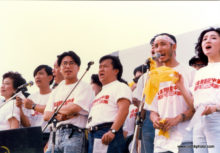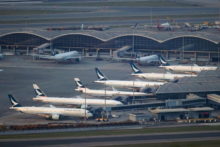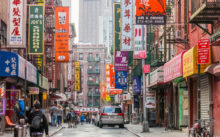Hongkongers are a people of diaspora. What runs in our blood is a long-stretching history of fleeing and returning from one place to another. From mid-1800s’ Taiping Rebellion to major conflicts in the last century like the Second World War, the Cultural Revolution, and the Vietnam War, our population has been made up of either refugees themselves or descendants of refugees who decided to call Hong Kong home. Pathetically, some scholars call this our “refugee mentality”: we are constantly on the run of grasping political stability and individual freedoms for ourselves, and for our future generations.
The moment the Sino-British Joint Declaration became official in 1984, Hong Kong people were once again put at a crossroad. On each side of a coin lay answers to the question: “to stay, or to leave?” The demoralized ones thought the only British remnant—the British National (Overseas) (a.k.a. BN(O)) passport—was no better than a tourist visa, while some optimists believed we need not sweat about the Handover when the Basic Law, the city’s future mini-constitution, started falling into place. People regarded that an omen of China opening up and democracy appeared to be the only way out.
Then came 1989, a year that shook the entire world. The world had just begun navigating through the end of the Cold War and its consequentially new found freedom brought by what happened in Eastern Europe and the USSR. In the wake of these incidents, a different narrative unfolded in China. Student protests calling for more transparent governance, more freedoms and democracy, and less censorship on the press gained momentum in the country’s capital and spread to 400 cities nationwide instantly. Surrounding the peak of the democratization movement, the authority made the following claims:
- The People’s Liberation Army would not be deployed against protesters;
- On June 4th, less than 300 people were killed, among which only 23 were students.
- The government would not settle old scores with affiliated persons.

https://loongese.com/blog/%E7%BA%AA%E5%BF%B5%E5%85%AD%E5%9B%9B%E4%B8%89%E5%8D%81%E5%B9%B4%EF%BC%9A%E6%B0%91%E4%B8%BB%E6%AD%8C%E5%A3%B0%E7%8C%AE%E4%B8%AD%E5%8D%8E
This was the authority bound to take over Hong Kong in 1997. This was the regime that we, after being domesticated by British ideologies, were left to anything but succumb to.
At this pivotal moment, the colonial government put forward a plan to restore citizens’ confidence by investing heavily on building an entirely new airport, new bridges connected thereto, and new towns around the city—a large-scale infrastructure project so grand that they coined it “The Rose Garden Project”—all driven by the ideal of luring more people to live in Hong Kong after 1989. The initial budget was HKD 200 billion, when the local government only had HKD 70 billion in reserve.

https://www.bangkokpost.com/business/2050463/hong-kong-airport-passenger-numbers-plunge-89-for-year
At that point, the message could not be clearer: the BN(O) passport granted to Hong Kong people did not guarantee the right of abode in the UK; no one could be certain that the Chinese government would keep their promise beyond 1997; the colonial government hastily put out a project that would drain taxpayers’ money down to the last penny. For a transient period, Hong Kong was to some their promised land, and to others, a stably thriving metropolis. Overnight the flight took off once again, only this time with an entirely different course.
The 5 years following 1989 was the peak of the emigration wave, when over 60,000 persons left the city every year; if student visas were included, the number would be up by some 20,000. Hong Kong’s population had just surpassed 5 million in 1980, which means over 10% of it had abandoned their home in the quinquennium. This unprecedented demographic change in the early 90s had threatened Hong Kong’s prosperity but more importantly on a worldwide scale, shaped how Chinese people and culture are perceived till this day.
Today no major city in the world comes without a Chinatown. Most forerunners of these enclaves are exactly those with some kind of Hong Kong roots. This is why when you visit a Chinatown, it’s more likely that you hear chatters in Cantonese, a language spoken predominantly in Hong Kong and Guangdong province, instead of Mandarin, the lingua franca of Mainland China. (Nonetheless the latter has become growingly ubiquitous in the last decade or so.)
The second exodus-engendered influence is food. When asked to think of the one dish that represents Chinese cuisine, the first that comes to your mind would probably be dim sum or wonton noodles—iconic offerings originated from the Southern China region—rather than Peking duck or Sichuan hotpot. (Not the case of fortune cookies though, it was 100% American.)

https://www.isango.com/theguidebook/top-best-chinatowns-world/
Another thing these new settlers brought was talent. 15-19% of those emigrated between 1987 and 1991 had attained a degree or higher in a time when only about 4% of the whole Hong Kong population did. With these skilled elites came considerable assets. The Canadian government estimated that in 1992 alone, CAD 5 billion flowed into the country from Hong Kong. The massive brain-drain and influx of wealth are arguably a loose attribution to stereotypes like Chinese immigrants being high-achievers and Crazy Rich Asians.
While gloominess and insecurity pervaded those who had chosen to stay, they were in truth shared sentiments of all Hongkongers, local or abroad. Language barrier, incompatible mode of living, business culture, etc. made Western countries no paradise for the departed. Since 1996, we saw a fraction of them started remigrating. Nevertheless, many of them returned after securing a foreign country passport. No matter how economically robust our country or city was becoming, at the back of our heads, we were still on the run. It never stopped, never will.
Reference: Skeldon, Ronald, and Xiaohu (Shawn) Wang. Reluctant Exiles? Migration from Hong Kong and the New Overseas Chinese. London. Routledge. 1994.
#hkhistory #hongkonghistory #hongkongcolonialhistory #refugee #refugeementality #emigration #emigrationwave #junefourth #therosegardenproject #chinatown #braindrain


